This article relies largely or entirely on a single source .(September 2019) |
Allured was the first Archdeacon of Barnstaple. [1]
This article relies largely or entirely on a single source .(September 2019) |
Allured was the first Archdeacon of Barnstaple. [1]

Barnstaple is a town in North Devon, England. It was a river port at the lowest crossing point of the River Taw, flowing into the Bristol Channel. The town centre still preserves a medieval character. From the 14th century, it was licensed to export wool. Great wealth ensued. Later the town imported Irish wool, but its harbour silted up and it developed other industries such as shipbuilding, foundries and sawmills. Its Victorian market survives, with a high glass and timber roof on iron columns. The Parish of Barnstaple had a population of 24,033 at the 2011 census. The population of the built-up area was 32,411 in 2018. The Barnstaple town area, with nearby settlements such as Bishop's Tawton, Fremington and Landkey, has a population of 46,619 (2020).

North Devon is a local government district in Devon, England. North Devon Council is based in Barnstaple. Other towns and villages in the North Devon District include Braunton, Fremington, Ilfracombe, Instow, South Molton, Lynton and Lynmouth. The district was formed on 1 April 1974 as a merger of the Barnstaple municipal borough, the Ilfracombe and Lynton urban districts, and the Barnstaple and South Molton rural districts.

The Bideford Railway Heritage Centre CIC in Devon, England, is responsible for the management of the Bideford station site. The Company is also responsible for Instow signal box which opens on occasional Sundays and bank holidays from Easter to October.

The Tarka Line, also known as the North Devon Line, is a local railway line in Devon, England, linking the city of Exeter with the town of Barnstaple via a number of local villages, operated by Great Western Railway (GWR). The line opened in 1851 from Exeter to Crediton and in 1854 the line was completed through to Barnstaple. The line was taken over by the London and South Western Railway (LSWR) in 1865 and later became part of the Southern Railway and then British Rail. In 2001, following privatisation, Wessex Trains introduced the name Tarka Line after the eponymous character in Henry Williamson's book Tarka the Otter. The line was transferred to First Great Western in 2006.
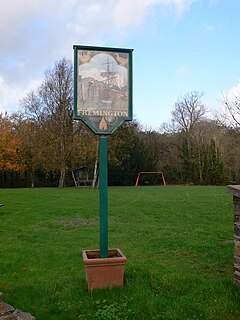
Fremington is a large village, civil parish and former manor in North Devon, England, the historic centre of which is situated three miles (5 km) west of Barnstaple. The village lies between the south bank of the tidal estuary of the River Taw and a small inlet of that river known as Fremington Pill. The parish is surrounded clockwise from the north by the parishes of Heanton Punchardon, Ashford, West Pilton, Barnstaple, Tawstock, Horwood, Lovacott and Newton Tracey, and Instow.

The River Taw rises at Taw Head, a spring on the central northern flanks of Dartmoor, crosses north Devon and close to the sea at the town of Barnstaple, formerly a significant port, empties into Bideford Bay in the Bristol Channel having formed a large estuary of wide meanders which at its western extreme is joined by the estuary of the Torridge.
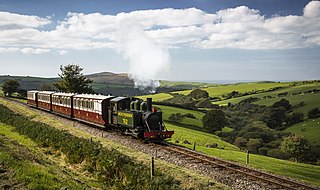
The Lynton & Barnstaple Railway (L&B) opened as an independent railway in May 1898. It was a single track, 1 ft 11 1⁄2 in narrow gauge railway and was slightly over 19 miles (31 km) long running through the rugged and picturesque area bordering Exmoor in North Devon, England. Although opened after the 1896 Light Railways Act came into force, it was authorised and constructed prior to that act. Therefore, as with all other railways, it was authorised under its own Act of Parliament and built to higher standards than similar railways of the time. In the United Kingdom it was notable as being the only narrow gauge line required to use main-line standard signalling. For a short period the line earned a modest return for shareholders, but for most of its life the L&B made a loss. In 1923 the L&B was taken over by the Southern Railway, and eventually closed in September 1935.
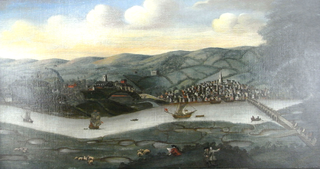
The ancient and historic village of Pilton is today a suburb within the town of Barnstaple, one of the oldest boroughs in England. It is located about quarter of a mile north of the town centre in the English county of Devon, in the district of North Devon. In 2009, the Pilton (Barnstaple) ward had a population of 4,239 living in some 1,959 dwellings. It has its own infants and junior school, houses one of Barnstaple's larger secondary schools, and one of Barnstaple's SEN specialist schools. North Devon Hospital is also within West Pilton parish. It has a Church Hall, two public houses, two hotels, and residential homes. It has residential estates of both private and public housing including flats. It also has a historic Church that dates back to at least the 11th Century.

Alverdiscott is a village, civil parish, former manor and former ecclesiastical parish in the Torridge district of Devon, centred 5.5 miles (9 km) SSW of Barnstaple.
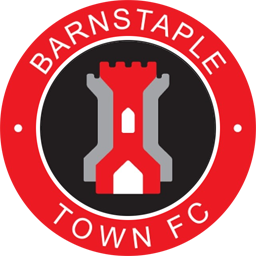
Barnstaple Town Football Club is a football club based in Barnstaple, Devon, England. They are currently members of Division One South & West of the Southern League and play at Mill Road.
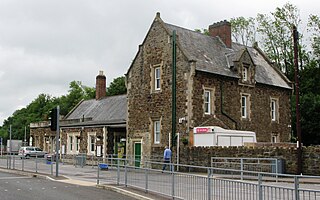
Barnstaple railway station is the northern terminus of the Tarka Line and serves the town of Barnstaple, Devon. It is 211 miles 25 chains (340.1 km) down-line from London Waterloo via Exeter St Davids. It is managed by Great Western Railway, which also operates the train service.
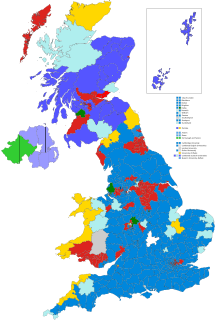
Barnstaple was a constituency centred on the town of Barnstaple in Devon, in the South West of England. It returned two Members of Parliament to the House of Commons of the Parliament of the United Kingdom until 1885, thereafter, one.
The Deanery of Barnstaple in north Devon is one of the deaneries of the Archdeaconry of Barnstaple, one of the archdeaconries of the Church of England Diocese of Exeter. The rural dean is Giles King-Smith.
The Archdeaconry of Barnstaple or Barum is one of the oldest archdeaconries in England. It is an administrative division of the Diocese of Exeter in the Church of England.

Barnstaple Rugby Football Club was established in 1877 and is a rugby union club based in Barnstaple, Devon. The club's first team play in South West Premier, the fifth tier of the English rugby union league system, following relegation from National League 2 South at the end of the 2017-18 season. The club colours are red and white and their nickname is Barum.
John Pollard was a 16th-century Archdeacon of Wiltshire, Archdeacon of Cornwall, Archdeacon of Barnstaple and Archdeacon of Totnes.

The Mayor of Barnstaple together with the Corporation long governed the historic Borough of Barnstaple, in North Devon, England. The seat of government was the Barnstaple Guildhall. The mayor served a term of one year and was elected annually on the Feast of the Assumption of the Virgin by a jury of twelve. However Barnstaple was a mesne borough and was held by the Mayor and Corporation in chief not from the king but from the feudal baron of Barnstaple, later known as the lord of the "Castle Manor" or "Castle Court". The Corporation tried on several occasions to claim the status of a "free borough" which answered directly to the monarch and to divest itself of this overlordship, but without success. The mayor was not recognised as such by the monarch, but merely as the bailiff of the feudal baron. The powers of the borough were highly restricted, as was determined by an inquisition ad quod damnum during the reign of King Edward III (1327–1377), which from an inspection of evidence found that members of the corporation elected their mayor only by permission of the lord, legal pleas were held in a court at which the lord's steward, not the mayor, presided, that the borough was taxed by the county assessors, and that the lord held the various assizes which the burgesses claimed. Indeed, the purported ancient royal charter supposedly granted by the Anglo-Saxon King Æthelstan (d.939) and held by the corporation, from which it claimed its borough status, was suspected to be a forgery.
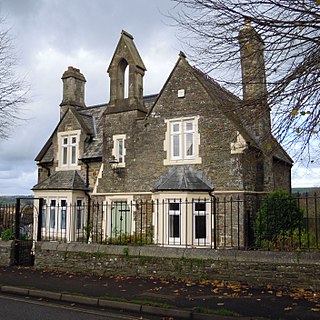
Barnstaple Cemetery is the burial ground for the town of Barnstaple in Devon and is managed by North Devon Council.
The Pottington Road Ground also known as the North Devon Greyhound Stadium is a rugby union ground and former greyhound racing stadium in Pottington Road, Barnstaple, North Devon.
| This article about a Church of England archdeacon in the Province of Canterbury is a stub. You can help Wikipedia by expanding it. |